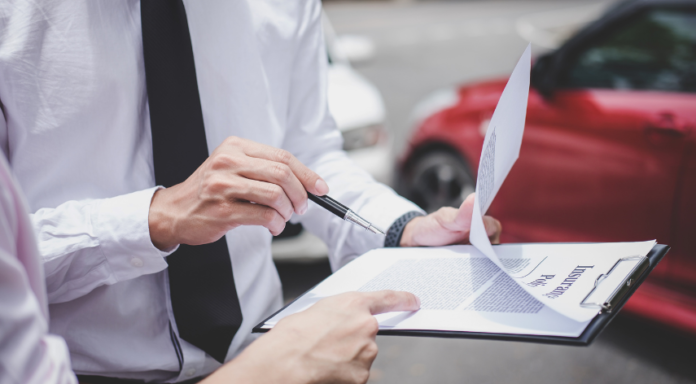A multi-car accident can morph into an intricate drama where determining liability is akin to solving a puzzle with many moving pieces. Each driver’s actions preceding the collision, witness statements, and state-specific traffic laws contribute to piecing together the story. The link between negligence and liability is a central theme in discerning fault. An understanding of this relationship is fundamental for those embroiled in multiple car accident claims as it can heavily influence the final outcome.
The Basics of Multi-Car Accident Liability
Determining who is at fault in a multi-vehicle pile-up is a complicated affair, often requiring expert analysis and detailed investigation. Liability in multi-car accidents is not a straightforward matter but rather a layered issue that takes into account various factors such as the drivers’ adherence to traffic regulations, weather conditions, and even vehicle malfunction. The concept of ‘comparative fault’ might also come into play, distributing blame across several parties, each contributing to varied extents to the chain of events leading up to the accident.
Types of Car Insurance Coverage
Insurance plays a pivotal role in resolving claims post-accident. When multiple vehicles are involved, the mix of liability, collision, and comprehensive coverages across the drivers becomes a web of intersecting policies. A comprehensive understanding of your policy and others’—especially in states with no-fault insurance laws—is paramount. In no-fault states, individual insurance coverage is more relevant than the liability of others, simplifying claims but potentially limiting recovery options.
Factors Impacting Insurance Claims in Multi-Car Collisions
In the wake of a multi-vehicle mishap, the role that each driver played in the incident is dissected by insurance adjusters, taking into account factors such as driving speed, distraction, and adherence to traffic signs. Each insurer’s assessment can be influenced by their policyholder’s account, eyewitness testimony, and the findings of law enforcement. State laws concerning vehicle accidents also heavily impact the pursuit and payout of claims, adding a layer of complexity to an already tangled process.
Steps to Take Immediately After a Multi-Car Accident
In the immediate aftermath of a multi-car crash, prioritizing safety by checking on the welfare of all involved and calling for medical assistance if necessary should be the first step. Once safety is assured, documenting the scene meticulously becomes critical. Take photographs or videos to capture vehicle positions, property damage, and any pertinent road conditions or signage. This evidence collection serves not only as a safeguarding gesture but also strengthens your position during the insurance claim process.
Filing an Insurance Claim After a Multi-Car Accident
The claim filing process demands prompt action and meticulous detail. Initiating a claim swiftly after the incident is quintessential, as is the thoroughness of the evidence presented to the insurer. Every documented detail, from the time of the accident to the extent of damages and personal accounts, contributes to the insurer’s understanding and subsequent decision-making regarding the claim.
How Insurers Determine Payment Responsibility
Insurance companies deploy adjusters who scrutinize each claim through investigating the circumstances of the accident and applying comparative fault rules. This complicated dance of determining who pays what portion of the damages can take time and often leads to negotiation between insurance companies. These negotiations are guided by various factors, such as the details of the police report, witness statements, and each party’s insurance policy coverage details.
Dealing with Multiple Insurance Companies
When facing a situation with several insurers, the complex negotiation process requires patience and clear communication. Always be concise and factual with adjusters, and take notes during conversations for future reference. Additional guidance on managing these discussions can be invaluable, as seen in the Consumer Reports Guide.
The Role of Subrogation in Multi-Car Accidents
Subrogation is a process where one’s insurer seeks repayment from the at-fault party’s insurer after covering their policyholder’s losses. This practice is particularly relevant in multi-car accidents, where insurers might try to reclaim the expenses they have incurred during settlements. While subrogation is primarily a matter between insurance companies, it’s important for policyholders to understand its potential impact on their claim and personal liability.
When to Consider Legal Advice in Multi-Car Accident Claims
In convoluted multiple car accident claims, enlisting the services of a legal expert can offer significant advantages. A legal professional specializes in cutting through the complexity, defending your rights, and ensuring that the settlement is both fair and reflective of the accident’s nuances. Their expertise becomes particularly critical when the stakes are high, and the claim involves severe injuries, extensive property damage, or contentious fault determinations.
Common Challenges and How to Overcome Them
Challenges in settling multi-car claims routinely arise around issues of fault and compensation. To tackle these successfully, remain calm, and persistent, and present your case backed by substantial evidence. Leverage all available resources, such as the insights offered by the Insurance Information Institute, to bolster your understanding and strategy for claim resolution.
Conclusion: Protecting Your Rights and Interests
The aftermath of a multi-car accident is often murky, with a complex interplay of legal and insurance factors weighing heavily on the involved parties. Keeping well-informed, organized, and proactive is the key to navigating this terrain effectively. With the proper approach and resources, you can assert your rights and interests, striving towards an equitable resolve that compensates for the upheaval wrought by such events.


